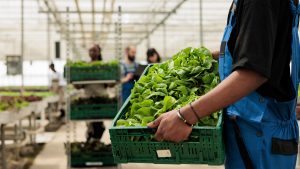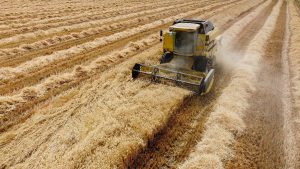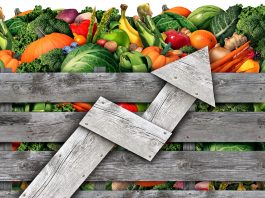Ilario Ingravallo, Mission Lead for Reducing Risk for a Fair & Resilient Food System at EIT Food, explains how supply chains can be strengthened to bolster food system resilience.
One in ten of us went hungry in 2023, some 780 million people worldwide. As it stands, this is already a sobering figure; yet is made even more foreboding given that by 2050, the world will need to feed almost 10 billion people.
It’s clear that decisive action is urgently needed to ensure that we can provide safe and nutritious food for generations to come.
But the global food system is vulnerable to multiple interconnected threats, which must be tackled to both meet the demands of a growing population whilst ensuring the health of our planet.
Climate change is already having a significant impact on global food production, as rising temperatures, extreme weather events, and changes in water availability reduce crop yields and threaten the livelihoods of farmers and food producers.
The rising demand to feed the world has led to an increase in more intensive farming practices, which in turn have led to natural resources becoming scarcer, including freshwater, fertile and healthy soils and biodiversity.
Finally, food systems have suffered from external disruptions affecting production and supply chains: conflict, pandemics and economic shocks.
These factors have left the global food system increasingly vulnerable to shock, weakening food security for many. Indeed, 2.3 billion people were categorised as moderately or severely food insecure in 2021.
Creating a more resilient food system
To ensure the food security of our current and future populations, the food system must become fairer and more resilient.
But how can we achieve this?
Firstly, by strengthening the resilience of the food system at every stage of the value chain. We need to consider how to help supply chain actors manage unprecedented challenges by providing specific new solutions, technology and approaches.
However, as well as addressing short-term crises, we must also address the food system more holistically, driving systemic change to support long-term food security. Crucially, the transformation to a better food system must be a collaborative, system-wide effort that is underpinned by innovation, equitable business models and the adoption of sustainable and resilient food production.

From producers and retailers to policy and legislation, we need collaboration across the food value chain, with all actors working together to create a more secure and sustainable food future. Equitability must be at the heart of this transformation to move towards a future where food systems are both fair and resilient.
Dealing with unpredicted challenges: Five key solutions to strengthening supply chains
1. Supply chain mapping and risk management
One of the pillars of risk management is prediction. Being able to predict when disruptions and crises will occur and their severity, allows for more time to make proactive, informed decisions. For example, more accurate predictions of climate patterns can allow producers to plan harvest times, water use and fertiliser use, reducing their vulnerability to the foreseen changes ahead.
Through innovation and technology, predictions such as these have become increasingly advanced. As we expect climactic disruption to continue with the rise of global temperatures, further investment in the research and development of these prediction methods is now crucial for the future of farming and food security.
2. Diversification
Just six crops account for 75% of global plant-derived energy intake: rice, wheat, corn, potato, soybeans and sugarcane. This overreliance on a handful of major crops increases the vulnerability of the food value chain to shocks such as disease, drought, and conflict.
For example, the war in Ukraine has triggered significant disruption to Europe’s grain supply, a staple of the European diet.
However, by diversifying our crops, the resilience of primary producers can be enhanced, and the intensity of shocks can be minimised as we have alternative options to hand when one is compromised.
3. Advanced technology
In times of crisis, we must use all available tools at our disposal, and in the case of food security, technological advancements across the board can be applied to promote resilience.
Educating and empowering farmers is essential to increasing the adoption of innovative technologies, and EIT Food’s GROW is one example of a capacity-building project which equips farmers with the necessary knowledge and skills to become entrepreneurs in the agricultural landscape.
Adaptable and agile operations are also achieved through building a resilient infrastructure into our systems.
Firstly, through improvements to the physical infrastructure of the food supply chain such as transport, but also through enhanced digital infrastructure to allow traceability, transparency, and amplified communication.
4. Data availability
Harnessing big data to enhance efficiencies across the food value chain can help producers to maximise the use of natural resources and minimise the environmental impact of food production.
For example, precision agriculture optimises farm management, allowing producers to use data to determine exact quantities of crop needs, such as irrigation and the nutritional content of soil. The EIT Food co-funded LINKDAPA project allows farmers to utilise big data in a low-cost and simple way by reducing the impact of fertilisers whilst still maintaining profitability.
5. Adaptable and agile operations
Today, the global food system is long and complex, with many actors across the food value chain. With this increased complexity has come greater vulnerability. Developing new innovations and products alone is not enough: businesses must be sufficiently agile to take up new technology, approaches, and innovations to navigate disruptions and ensure seamless operations.
An example of this is the EIT Food programme WE Lead Food, which opens again for applications on 8 March 2024. The programme enables women in the food sector to gain valuable leadership competencies, whilst also fostering collaboration across networks, thereby strengthening resilience amongst individual businesses. When leaders collaborate and learn from other leaders with shared or similar experiences, businesses can become more resilient to change and shocks.
Transforming food systems for a sustainable future
These interventions have the potential to be incredibly impactful, but alone, they are not enough to build the resilience we need. As well as addressing specific challenges, we also need a systemic vision of food system transformation that fosters resilience at every level, from farm to fork.

Firstly, we need to promote innovation that strengthens the roots of our food chain and improves the sustainability of primary production. One issue is that intensive farming methods strain natural resources and environmental health. Consequently, degraded soils, low biodiversity and over-extracted water levels result in the loss of natural capacity to absorb environmental shocks. Regenerative agriculture methods, on the other hand, enhance ecosystem services, increasing resilience to shocks and promoting overall environmental health.
We also need to support a shift to healthier and more sustainable diets. Consumption levels and our global overreliance on animal protein place a large strain on land and natural resources. Encouraging consumers to eat seasonally and adopt plant-forward diets can ease pressure on land and water use. The urban integration of shorter supply chains can also enable consumers to access local food more easily. EIT Food hosts a free online course which aims to empower consumers by providing them with a broader context on the food supply chain in times of crisis and why shorter ones, where possible, are needed.
Finally, we need to develop solutions and practices that foster a circular and resource-efficient food system, aiming to reduce food loss and waste. With a third of all food going to waste, reducing this loss will have a profound impact on the environmental strain created by food production and the pressures of feeding a growing population.
Additionally, through innovation, there are new opportunities in the valorisation of food waste. EIT Food RisingFoodStar Kern Tech is an Austrian startup which repurposes food waste by creating novel products from surplus fruit pits, while EIT Food’s Phenoliva initiative valorises surplus olive oil by extracting a food antioxidant, and has even led to the creation of dedicated startup Gaia Tech.
To feed growing populations and achieve a more resilient food system, a system-wide transformation is needed alongside solutions to specific challenges. By transforming our food system, not only can we strengthen our ability to navigate challenges ahead, but create a more equitable future that provides healthy, nutritious food for all, while protecting the planet we all call home.









